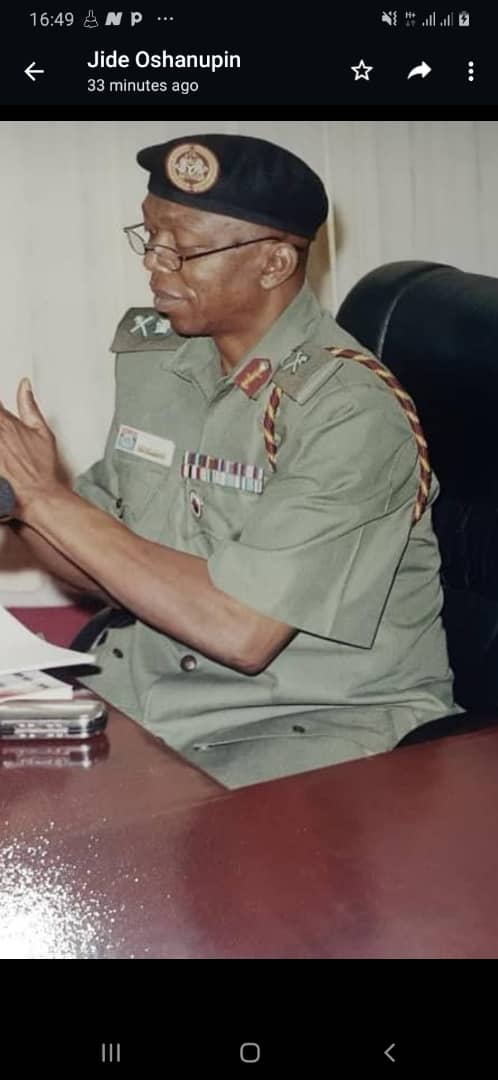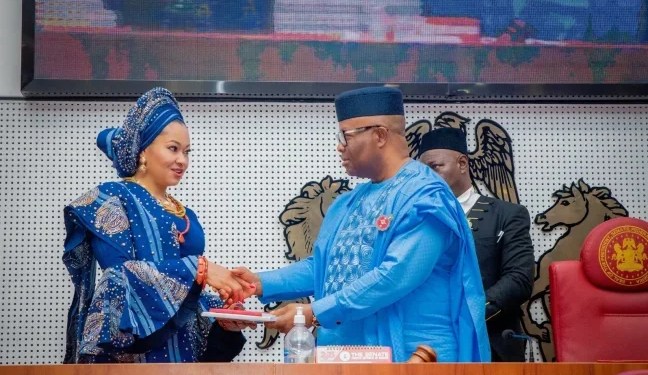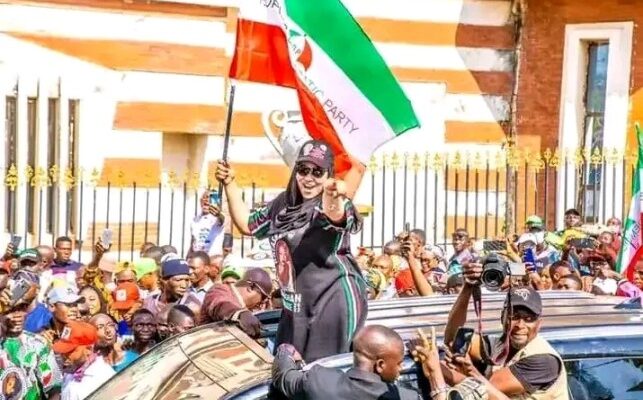By Tunde Olusunle
I was struck by the peculiarity of his name tag on our premiere meeting. The first time I saw such a striking configuration was when I encountered the configuration *PUN OMERUO* on the chest of a former military administrator of Kogi State, who I would later serve as Chief Press Secretary, (CPS).

As a student of literature, I was amazed that the figure of speech, “pun,” could also be someone’s name. It turned out it was an acronym for Omeruo’s first names, Paul Uzoanya Ndimele. And here again, I was engaging another curious combination, *JOS OSHANUPIN.* My first reaction in my mind was: Why would this man announce that he was born in Jos, the once-upon-a-time home of tourism in north central Nigeria, on his name tag?


The hitherto temperate, calm and sedate abode of curiously stacked rocks and ranges, has, very sadly, been blighted by years of internecine confrontations between Fulani voyagers and indigenous pastoralists.
His turnout could not but strike you. His uniforms, typically starched khaki, well tucked into his trim, smart frame, was a delight to behold. Not for him the protruding abdomen of some of his colleagues who, to borrow from the peculiar lexicon of the grandmaster of grammatical bombast, Patrick Obahiagbon, had surrendered to wholesale *pepper-souping and isiewu-lizing.* His trousers were neatly buried into his ever-gleaming black boots, his official regalia complemented by a beret adorned with a feathery tuft. This is not forgetting his famous swagger stick which he swung with supreme style and confidence. He acknowledged the compliments paid him by his officers and men, with a curt salute, as he routinely toured sections of what is described in the military as “area of responsibility,” (AOR).
Julius Olakunle Sunday Oshanupin, (now you know where the “JOS” is coming from), was Commander, Guards Brigade, with specific responsibility for the protection of the President. Olusegun Obasanjo, himself a former army General was the President, Commander-in-Chief, (C-in-C). The grip of Oshanupin’s handshake is firm as he receives your hand, smiles and exchanges greetings with you in our indigenous Okun tongues. He is naturally delighted that someone like you a thoroughbred professional in your own right, who is serving in the same administration, also hails from his own corner of Nigeria. He knows that people from our parts, have to work extra-hard to earn recognition in a system characterised by twisted merit and a skewed reward system.
Oshanupin’s area of jurisdiction spanned the entire federal capital territory, (FCT) and abutting areas. A member of the elite armoured corps of the Nigerian Army, he was appointed to this to position when he was a Brigadier-General. The rank is usually abbreviated by the military as “Brig Gen.” A quiet operator, he was more regularly seen if there was an event which necessitated the movement of the President to events and locations outside the geographical area of the State House. From the International Conference Centre, (ICC); to the Transcorp Hilton and the Sheraton Hotels, regular venues for state events therefore, Oshanupin was a regular fixture. He was also prominent on the escort entourage of the C-in-C en route his trips, locally or internationally. Working with an energetic, hyperactive President like Obasanjo, who devoted as much time to his primary assignment, and equal attention to international relations, by the way, was no cup of cake. A team player, he discharged his duties very distinctively and unobtrusively, earning deserved plaudits.
Elsewhere, I have alluded to a very striking photograph taken on the occasion of his decoration with the rank of Major General in 2005, which symbolised the true Nigerian-ness of the Obasanjo era. Obasanjo’s aide-de-camp, (ADC), Christopher Jemitola, (then a Colonel), was at the left of that picture. Obasanjo was next, hanging the peeps of Oshanupin’s new rank from the left; he was followed by Oshanupin himself, and then Atiku Abubakar, Vice President to Obasanjo. In the ethno-religiously fractious polity which has been our lot since the coming of the incumbent dispensation, that photograph speaks volumes about Obasanjo’s painstaking efforts at multilevel balancing. Jemitola is from Edo State, (South South); Obasanjo, Ogun, (South West); Oshanupin, Kogi, (North Central) and Atiku, (Adamawa), North East. This manner of accommodation and inclusiveness, has been serially trampled upon, even jettisoned by the present government.
Following Oshanupin’s retirement after a distinguished and eventful near four-decade service to fatherland over ten years ago, he has become most committed to, and visible in community service and development. And how he has spontaneously transmuted from the stern-faced, no-nonsense military General, to an inimitable pacifist and consensus builder, should constitute the subject of another discourse. At the levels of his hometown, Ekinrin Adde, Ijumu local government area, (LGA), and the Okun country, straddling the six Okun LGAs: Kabba Bunu; Ijumu; Mopamuro; Yagba East, Yagba West and *Oworoland* in Lokoja LGA, Oshanupin has been at the fore of charting a new course for his people.
At various times, Oshanupin has chaired or co-chaired bodies like the: Okun Interest Group, (OIG), with Dr Stephen Olorunfemi, and Okun Think Tank, (OTT), the technocratic arm of the Okun Development Association, (ODA), with Professor Eyitayo Lambo. Irrespective of the venue of a meeting concerning the Okun trajectory, and so long as Oshanupin is invited, you can be sure he will attend. Except of course if he is out of Nigeria, or is otherwise previously committed. From Isanlu, to Iyah-Gbedde, to Kabba, Ekinrin Adde, Lokoja, to Abuja, Oshanupin is either hosting, or attending meetings to build a new Okun mindset. His conviction is captured by his adaptation of a military expression, to wit that people should decidedly “chest out,” for causes they believe in. Be sure to be served frothing, farm-fresh palmwine, among other choice menus and beverages, should Oshanupin be the chief host, at any venue or location.
Instructively, Oshanupin was one of the Okun leaders who led a delegation to meet with former President Goodluck Jonathan on the eve of his election in 2011, to press for increased infrastructural development in Okunland. The meeting also canvassed the accommodation of more Okun people in the Jonathan administration. At that meeting, Okun leaders appealed to Jonathan for the conversion of the age-old College of Agriculture, Kabba into a full-fledged university. How Lokoja the Kogi State capital became the host of what is today the Federal University, will be subject for further inquisition. Key advocates of the adoption of the College of Agriculture, Kabba as site and location of a federal university, included: Lambo, (former Health Minister); Bayo Ojo, SAN, CON, (former Attorney General and Justice Minister) and Oshanupin. They must be deservedly applauded. Oshanupin, and some other well-meaning, Okun-minded people, was also one of those who virtually rammed the imperative for the development and fruition of the College of Education Technical Kabba, (COETK), down the throat of former Kogi State Governor, Ibrahim Idris.
This does not detract from the efforts of Clarence Olafemi, former Speaker of the Kogi State House of Assembly, who acted as governor for a brief spell, during which the incumbent, Idris, had to undergo a court-ordered reelection between him and the late former Kogi Governor, Abubakar Audu, in 2008. Aware of the repeated consignment of the project under the carpet by successive governments, Oshanupin and company therefore, virtually held a “pistol” to the throat of Idris, in a case of: “We (Okun people), will support you, only to the extent that you build for us COETK which had been on the drawing board since eternity.” Idris had no option than to agree, much as the physical growth of the institution has remained below par.
Worried about the wholesale hijack of politics in Okunland by sundry money bags and jobbers, Oshanupin has serially advocated recourse to justice, fairness and equity, as minimum consideration, in the appropriation of offices and positions. He admonishes return to those ideals which bind our people together, away from the mercantilism and triumphalism which characterise contemporary politicking. His involvement in sociopolitical matters concerning the Kogi West zone, derives from this concern. The exploration of collaboration between Kogi West and Kogi Central which were both excised from the old Kwara State, and joined with Kogi East from the old Benue State, is also driven by considerations of respect for meritocracy, consensus building and fairness to all.
A critical component of Oshanupin’s drill in the military was that of “taking the enemy by surprise.” More than one occasion, Oshanupin had “caught” me by surprise in my own home. He is first to check up on you if you were indisposed, or had otherwise been out of circulation for a while. And he jokes with you in a mix of our idiolects and pidgin English, charging you in military lingo, to “wake up,” shake off your indisposition, that is. He is that compassionate. And he is not given to protocol and officialese, easily jumping behind the wheels of his car to catch up with meetings and appointments, for a former two-star General in the military. It wouldn’t matter if it’s a truck or a more cosy automobile, he moves. He is that unassuming and down-to-earth.
Jide, Oshanupin’s son found me out in church a few weeks back. He came over to my section and whispered to me that he was working with his siblings to put up a surprise reception for their father. The event he said, was to commemorate his platinum jubilee birthday. The birthday proper was on June 26, 2022, but the celebration had been moved forward by a few days. Recognising my relationship with the older Oshanupin, Jide conspiratorially told me: “He’s not aware of this plan, Sir.” I understood him, even though I was sceptical if the young Oshanupins could pull it off without giving themselves away to a very sharp and perceptive father.
Saturday July 9, 2022, all roads led to the *Ladi Kwali Hall* of the Sheraton Hotel, Abuja. Between walking through the expansive lobby, to posing for photographs at the “red carpet” entrance to the venue, and being ushered to your seat, your eyes caught familiar faces. It was a very well attended event which definitely achieved the surprise effect it was intended to have, a properly scripted ambush of an army General by his civilian children! It was an evening of colour and conviviality and reminiscences and tributes, food and drinks, music and dancing too.
Justice John Afolabi Fabiyi, CFR, retired Justice of the Supreme Court of Nigeria, (JSC) and Major General David Medaiyese Jemibewon, CFR, former Governor of the old Oyo State and, former Minister of Police Affairs, were in attendance. Chief Bayo Ojo, SAN, CON, former Attorney General and Minister of Justice; Maj Gens Samuel Atawodi and T O Ike, both coursemates of Oshanupin, were present at the event. Maj Gens Funso Owoniyi and Taiwo Durowaiye; Col Tunde Fagbemi; Commander Lawrence Fabiyi and Chief Dan Kunle, were also present. So were Dr Tunde Arosanyin, Chief Akin Fagbemi, Bayo Fatimehin, Chief and Mrs Femi Melefa, as well as Mr and Mrs Ayo Anjorin.
From Oshanupin’s hometown of Ekinrin Adde came the monarch, the *Olu Adde,* Oba Anthony Bamigbaye Idowu. The royal father had just before Oshanupin’s Abuja reception, presided over a ceremony back home in Ekinrin Adde, where he was invested with a “Lifetime Achievement Award.” This was in acknowledgement of his selfless contributions to the development of his community. The *Olujumu of Ijumu,* Oba Williams Olusegun Ayeni, and the immediate past Chairman of the ODA, Ambassador Babatunde Paul Fadumiyo, honoured the event. Yeye Funmilayo Bodunde, a frontline Okun leader; Mrs. Folashade Joseph, Chief Executive of the Nigeria Agricultural Insurance Corporation, (NAIC); Alhaji Aliyu Badaki, and Mr. Fred Olutekunbi, also graced the programme.
Gen Oshanupin began his educational pursuit at the United Anglican Primary School, Ekinrin Adde, before attending St. Peters College, Kaduna. He is a regular combatant of the Nigerian Army Armoured Corps, 15th Regular Course, Nigerian Defence Academy, (NDA), commissioned on June 19, 1976. En route his ascension to the heights of topmost military hierarchies, he attended several courses in Nigeria, the United States, India and Sweden. He held several military appointments, and participated in military operations in Lebanon, Chad Republic and Somalia, among others, under the auspices of the United Nations, (UN) and the African Union, (AU).
He served variously as Directing Staff, Armed Forces Command and Staff College, Jaji; Colonel Training, Army Headquarters and Colonel General Staff at the headquarters of the Third Armoured Division, Jos. After his tour of duty as Commander, Guards Brigade, he was appointed Director Policy, Defence Headquarters, and Commandant, Armoured Corps Centre and School, Bauchi. He was also General Officer Commanding, (GOC), Third Armoured Division; Deputy Commandant, National Defence College, (NDC), Abuja; and Chief of Defence Research and Development, respectively. He received many medals and decorations including Directing Staff Daggar (psc+); Distinguished Service Star, (DSS) and Fellow National Defence College, (NDC). Oshanupin equally obtained a Master of Science, (MSc) in Strategic Studies from the University of Ibadan.
Post-retirement in 2013, he served on the Ad Hoc Investigative Mechanism, (AIM), established by the African Union, (AU) and the Inter-Governmental Authority on Development, (IGAD). The group met in
in Khartoum and Juba, capitals of Sudan and South Sudan, respectively, over several weeks. He was a member of the three-man team of senior African military Generals, which probed tensions between Sudan and South Sudan, on accusations of rebel activities between both countries. The African Union High Investigation Panel, (AUHIP), headed by former South African President, Thebo Mbeki, suggested the setting up of the team, among other conflict resolution proposals.
Oshanupin is happily married to Mrs Esther Oshanupin, an educationist and the union is happily blessed with four children: Yetunde, Folashade, Olajide and Bolanle, who have all started their families. He is at his happiest when his grandchildren come visiting in his Abuja residence or his countryside home in Ekinrin Adde, running around the house. He loves hunting, golfing and lawn tennis, among other interests. Indeed, he made a foray into cattle rearing back home in Ekinrin Adde, many years ago.
Tunde Olusunle, PhD, poet, journalist, author and scholar, is a Member of the Nigerian Guild of Editors, (NGE).



